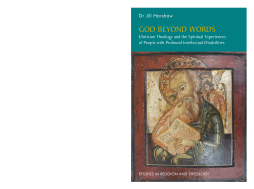
Additional Information
Book Details
Abstract
Responding to the view that people with profound intellectual disabilities cannot enjoy spiritual experiences, this book pushes the boundaries of intellectual disability theology. Thought-provoking and sensitive, this book poses important questions about the nature of faith and how the Church treats people with intellectual disabilities.
Dr Jill Harshaw teaches Practical Theology in the Institute of Theology, Queen's University Belfast. She is a key contributor to the Centre for Intellectual Disability Theology and Ministry based at Belfast Bible College which offers opportunities for graduate research, training for faith groups around the inclusion of persons with intellectual disabilities and their families, and advocacy on relevant ethical and ecclesiological issues. Jill's passion for disability theology is stimulated by her daughter, Rebecca, who has profound and complex intellectual disabilities.
God Beyond Words has significance for and beyond studies in theology and various experiences of disability. Jill Harshaw provides new insights into the spiritual lives of people with intellectual disabilities and she challenges us more broadly to rethink how diverse spiritualities can be researched. This is a very important book that should be read as widely as possible.
Dr Wayne Morris, Associate Dean, Faculty of Humanities, Head of Theology and Religious Studies, University of Chester, author, Theology without Words, co-author, Making a World of Difference
Jill Harshaw offers a stimulating book which will interest all people who accompany others in their experience of faith as growth in trust, as well as emergent belief. It will appeal beyond those already familiar with disability theology among Christians and others.
Anthony Kramers
Health and Social Care Chaplaincy
God Without Words probes deeply into the methodological and theological obstacles to understanding the spiritual experience of people with profound intellectual disability to discover we have to ask even more primordial questions about how God reveals Godself at all. The result is a wide-ranging scriptural, philosophical, and theological inquiry into the God who would be perceived by human flesh despite the limitations of cognition. What was intended as an intervention in the arena of intellectual disability has ripple effects in Christian theology as a whole.
Amos Yong, professor of theology & mission, Fuller Theological Seminary, and author of Theology & Down Syndrome: Reimagining Disability in Late Modernity (2007)
Table of Contents
| Section Title | Page | Action | Price |
|---|---|---|---|
| God Beyond Words | 3 | ||
| Acknowledgements | 9 | ||
| Introduction | 11 | ||
| Chapter 1 - A Brief Contextual Survey of Disability in Christian Theology and Society | 21 | ||
| Chapter 2 - The Role of Qualitative Research in Intellectual Disability Theology | 52 | ||
| Chapter 3 - Issues of Theological Languages | 85 | ||
| Chapter 4 - Theological Objections and Possibilities | 117 | ||
| Chapter 5 - Arguments from Scripture | 131 | ||
| Chapter 6 - The Mystical Experience of God | 146 | ||
| Conclusion | 177 | ||
| Bibliography | 191 | ||
| Subject Index | 202 | ||
| Author Index | 207 | ||
| Blank Page |
